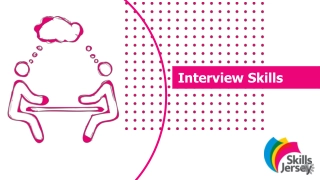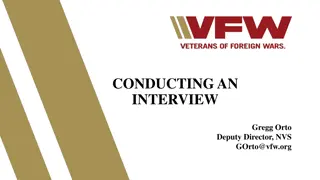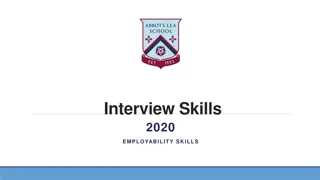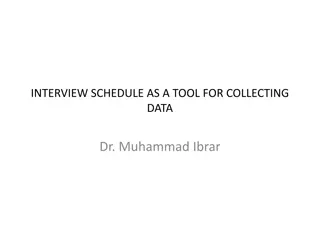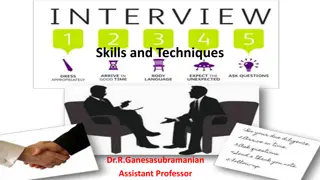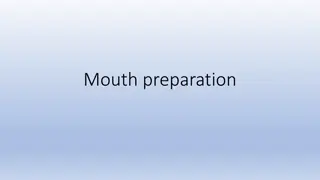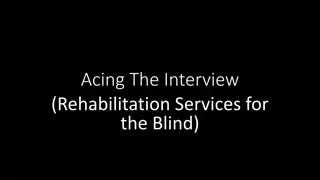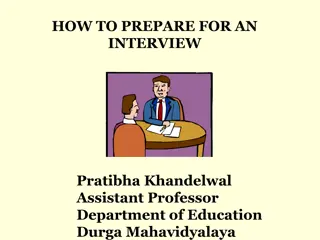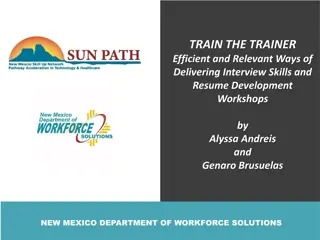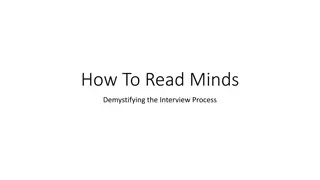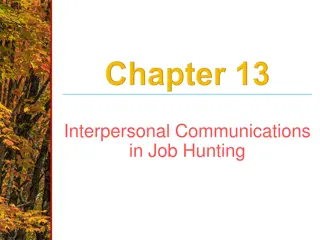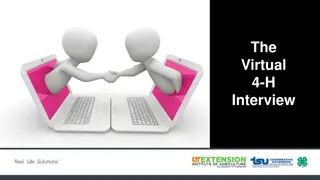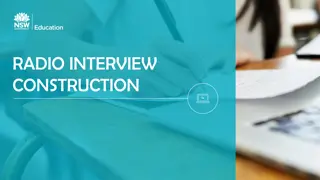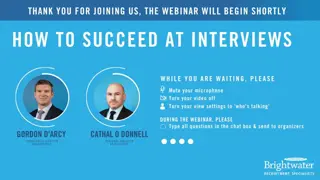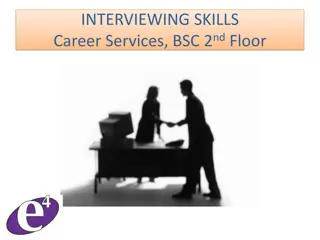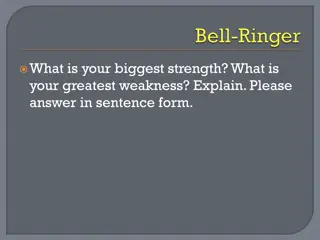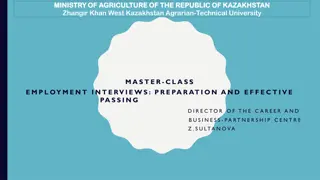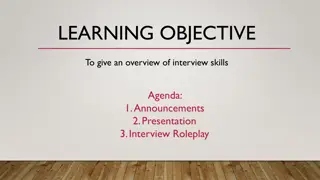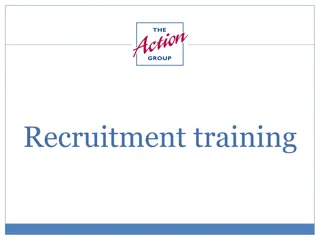Interview Preparation Essentials for Success
Gain valuable insights into interview preparation with top tips and ideas to equip yourself for success. Discover the key elements of what an interview entails, what interviewers are looking for, and how to navigate different types of interview questions effectively.
Download Presentation

Please find below an Image/Link to download the presentation.
The content on the website is provided AS IS for your information and personal use only. It may not be sold, licensed, or shared on other websites without obtaining consent from the author.If you encounter any issues during the download, it is possible that the publisher has removed the file from their server.
You are allowed to download the files provided on this website for personal or commercial use, subject to the condition that they are used lawfully. All files are the property of their respective owners.
The content on the website is provided AS IS for your information and personal use only. It may not be sold, licensed, or shared on other websites without obtaining consent from the author.
E N D
Presentation Transcript
Preparing for an interview Top tips, hints and ideas (NAME OF TRUST) CapitalNurse is jointly sponsored by Health Education England, NHS England and NHS Improvement
AIM To equip you with knowledge and skills to help you prepare for an interview
Types of interview questions Five of the most common 1. Classic 2. Career goals 3. Character 4. Competency 5. Curveball or creativity
Classic Questions What are they? They come in all shapes and sizes and they re generally asked to put the ball in your court. The interviewer is saying they want you to do the talking. One word answers won t cut it here! When are they asked? Classic interview questions are likely to come up in almost every interview making them the most common across all fields and interview types. How to answer them: Answering a classic interview question well comes down to your ability to talk about how your skills, experience, and personality match up with what the employer is looking for. Take this as the perfect opportunity to prove you re a good fit. The worst thing you can do: Tell your entire life story, complete with why you stopped believing in Santa at age 6. Examples: Tell me about yourself What are your weaknesses? Why is there a gap in your work history? Why did you apply for this position?
Career goal questions What are they? Career goal questions are asked to let employers know where you are in your professional life, and what your future plans are. Your answers will tell them whether you re a good fit long-term, or if their role is simply a stepping stone to something else (and/or a second choice). When are they asked? Career goal questions are likely to be asked in a number of circumstances. How to answer them: Preparation is key. Do your organisation research not only to understand what they re looking for right now but also what they ll need to have further down the line. The worst thing you can do: Tell them you want to be doing their job (or similar, clich answer) Examples: Why do you want to work in this organisation? Where do you want to be in five years time? What s your dream job? What motivates you?
Character questions What are they? Character questions are a reliable indicator of what you re capable of achieving. Your answers will reveal everything an employer needs to know about your morals, integrity, values, and generally speaking who you really are. When are they asked? Character questions could feature at any kind of interview, but will often be asked when the role involves team work, difficult situations (e.g. with customers or clients), and making quick, fair judgments. How to answer them: Show you can do the job, and fit in. Focus on demonstrating your appreciation of values (both your own and the organisation s), positive work ethic, ability to work well with others and handle tough situations. The worst thing you can do: Lie Examples: What are your core values? Who do you admire, and why? Tell me about a time you dealt with a difficult person When were you last angry, and why?
Competency questions What are they? Competency questions focus on finding evidence of your ability to do the job, requiring you to provide real examples of times you ve demonstrated or how you d react in .situation . Their purpose? To weed out the candidates who are all talk, and shortlist the ones who can actually back up their claims. When are they asked? Competency questions are often asked when practical ability takes precedence over previous experience, achievements, or qualifications. How to answer them: Three words: Prepare. Your. Examples. Interviews can cause the best of us to draw a blank and relying on thinking fast is unlikely to yield the best results. Before the interview, firstly highlight the key skills in the job description and secondly, think of an example that proves you have each attribute. Then, use the STAR technique to give context to your answer.
Competency questions The worst thing you can do: Make it up as you go along Examples: Tell me about a time you ve worked to/missed a deadline Tell me about a big change you ve had to deal with Tell me about a time you supported a member of your team who was struggling Give an example of a time you ve had to improvise to achieve your goal
Curveball/Creative questions What are they? These questions are designed to put you under pressure, whether it s to throw you a curveball and see how well you can dodge it, or test your ability to be creative on the spot and there s no single right answer. When are they asked? It s not uncommon for a curveball or creativity question to be thrown into just about any type of interview and at any point How to answer them: Remember: your answer isn t as important as your reasoning. So instead of looking at the question literally, take a deep breath and think about why they re asking it. The worst thing you can do: Cry Examples: If you were a medicine, what would you be? Every CV has one lie in it. What s yours? Tell me about the last good idea you had
Futher information https://www.youtube.com/watch?v=chkoryAGYL c www.monster.co.uk http://www.blueskyinterviews.co.uk/ http://www.reed.co.uk/career- advice/topics/interview-advice


